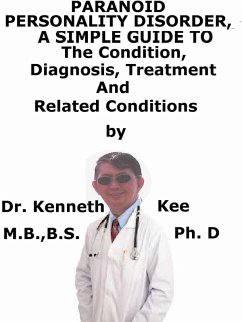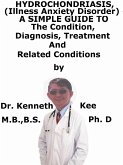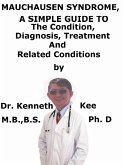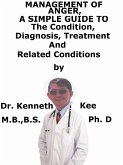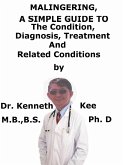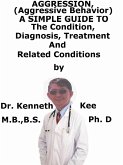This book describes Paranoid Personality Disorder, Diagnosis and Treatment and Related Diseases "Anyone not paranoid in this world must be crazy Speaking of paranoia, it's true that I do not know exactly who my enemies are. But that of course is exactly why I'm paranoid." ― Edward Abbey Paranoid personality disorder (PPD) is a mental disorder in which a person has a long-term pattern of extreme distrust and suspicion of others. People with paranoid personalities rarely confide in others, and tend to misconstrue harmless comments and behavior as malicious The person does not have an advanced psychotic disorder, such as schizophrenia. People with the disorder are more likely to have a relative with schizophrenia, indicating there could be a link between the two disorders. People with a paranoid personality disorder are normally not able to admit their own negative feelings toward others but do not normally lose touch with reality. They will not confide in people, even if they prove reliable, for fear of being exploited or betrayed The precise cause of paranoid personality disorder is not known. Doctors believe that a combination of biological and environmental factors can lead to paranoid personality disorder. It seems to be more frequent in families with psychotic disorders such as schizophrenia and delusional disorder, which indicates that genes may be involved. Other factors may have a part as well. PPD appears to be more frequent in men. Early childhood trauma may be a factor that contributes to PPD. Paranoid personality disorder can occur from negative childhood experiences caused by a threatening domestic environment. It is triggered by excessive and unfounded parental rage and condescending parental influence that cause profound childhood insecurities Symptoms People with PPD are very distrustful of other people. As a result, their social lives are severely limited. They often believe that they are in danger and look for proof to support their suspicions. They have difficulty seeing that their distrust is out of proportion to their environment. A mnemonic to symptoms of PPD is GET FACT: Grudges held for long period Exploitation expected Trustworthiness of others doubted Fidelity of sexual partner questioned Attack on character are perceived Confides in others rarely Threatening meanings read into events One of the main differences between paranoid personality disorder and schizophrenia is that hallucination is not a normal feature of paranoid personality disorder Diagnosis The doctor will ask the patient about the symptoms and history. The mental health professional will do a comprehensive appraisal. Treatment The treatment is difficult because people with PPD are often very distrustful of doctors. If treatment is received, talk therapy and medicines can often be successful. The treatment for PPD can be very effective. Psychotherapy is the most capable method of treatment for paranoid personality disorder: 1.Help the individual learn how to cope with the disorder 2.Learn how to communicate with others in social situations 3.Help reduce feelings of paranoia Medicines can also be helpful, particularly if the person with PPD has other linked disorders such as depression or anxiety disorder: 1.Antidepressants for depression 2.Benzodiazepines for anxiety 3.Antipsychotics for the paranoia Combining medication with talk therapy or psychotherapy can be very effective Medicines are advised to be given for a short period because the patient can be distrustful of them after some time. Psychotherapy should be continued for life because there is no cure for this illness Properly treated the patient can even hold a job. TABLE OF CONTENT Introduction Chapter 1 Paranoid Personality Disorder Chapter 2 Causes...
Dieser Download kann aus rechtlichen Gründen nur mit Rechnungsadresse in A, B, CY, CZ, D, DK, EW, E, FIN, F, GR, H, IRL, I, LT, L, LR, M, NL, PL, P, R, S, SLO, SK ausgeliefert werden.

